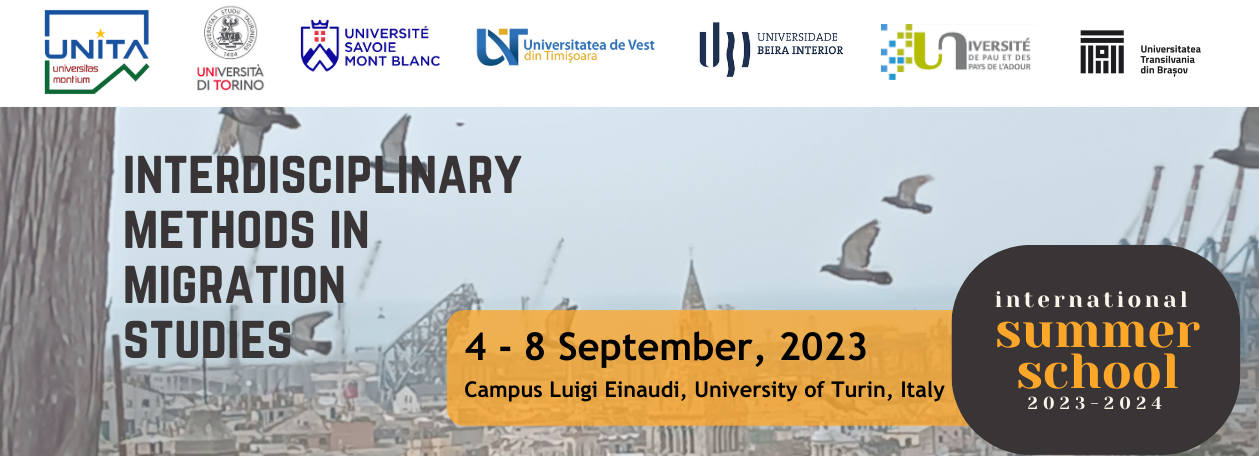
|
|
|
Program > September 6SEPTEMBER 6, 20239.00 - 12.00 Gabriele Proglio Università degli Studi di Scienze Gastronomiche di Pollenzo The decolonial walk is an intersubjective research method which aims to problematize the colonialities of Turin by visiting the city's memorial sites of colonialism and racism (monuments, commemorative plaques, memorial stones, arches, gardens, etc.) and with the entropic interaction of the participants. By adopting an intersectional approach, combined with tools of oral history, the walk is a practice of resignification of memory, recovery of grey areas of the colonial past, and problematization of the racist legacies in a postcolonial context. The case of the Valentino Park (Parco del Valentino) in Turin is particularly interesting for its many references to overseas, its international expositions, and the construction of human zoos.
A conversation on gender, mobility, and Digital Humanities - Early modern period Teresa Bernardi Università di Padova. Centre for Advance Studies in Mobility & Humanities (MOHU) The workshop (3 hours) concerns the relationship between gender and human mobility. In the first part, I will discuss with participants why it is so important to study mobility and migration adopting a gender-sensitive approach. In the second part, I will show which types of archival sources can be used to explore this topic in relation to the early modern period. Administrative, judicial, and literary records will be at the core of the conversation. In the third and last part, I will use my on-going project on marriage and mobility in Venice as a case study, to examine the different choices behind the research: concerning archives, methodologies, teamwork, and the use of digital tools (e.g. Geovistory: https://www.geovistory.org/). The workshop will also give participants the opportunity to discuss and receive feedback on their current or future research projects. No prior knowledge is necessary. Attendees from various disciplines and at different career levels are welcomed.
14.00 - 17.00 Migration narratives on screen Catarina Sales Oliveira Universidad de Beira Interior/Centro de Investigação e Estudos de Sociologia (CIES-IUL) Migration is particularly dear to cultural production in general and to cinema in particular. This is justified because it often features strong elements of human drama, life stories of struggle and resilience as well as the picturesque nature of cultural diversity and processes of confrontation between cultures. There are very different films about migration, from mainstream Hollywood films to more auteur productions and also documentaries with an investigative or even autoethnographic basis. In this session, we will watch and discuss a selection of films in order to deconstruct how the problematic of migration and its protagonists is represented and how it relates to the prevailing social perceptions about migration.
18.00 - 20.00 SCREENING. Bidon: Nação Ilhéu Celeste Fortes & Edson Silva Delgado Universidade de Cabo Verde. Centro de Investigação em Gênero e Família (CIGEF) In Cape Verde the far away land is romanticized as a place of abundance. It is from there that the Bidons arrive, sent from different destinations, filled to various rhythms, representing the victory of the emigration and personifying the presence of those who had to leave the country. Bidon: a Cape Verdean dream stitches three feminine stories, exposing the mediation of the Bidon, central character in Cape Verdeans life, in the relationship between who stayed and those who emigrated. Camila was 11 when she saw her mother emigrating to the United States. For 18 years they have strengthened their relationship, shortening the distance through the constant presence of the Bidons prepared with maternal affection. Dona São, in the products that she buys from the Bidons, imported by local merchants, seeks to escape poverty and support her children. The outlying districts of the island are the road that runs for the street vending, feeding the dream of reaching the land far away. Patricia already lived there in the land far away. She returned as a child and seeks to rescue the sensory memories of this experience by buying several products imported from the United States. She doesn´t want to go back there, but like most capeverdean daughters and sons, she dreams someday to realize the Cape Verdean dream: to receive a Bidon.
SCREENING. Hanging Out With the Guys Mari Korpela Tampere University Temporary labour migration of skilled professionals is increasing in various parts of the world. Often, such expatriates are accompanied by their children but very little is known of their views and experiences. In my ethnographic research project, I investigate the views and experiences of such children and youth in Finland. During my fieldwork, I filmed a group of 14-year-old boys on their free time in a Finnish town. The film is a reflexive story of our collaborative film project that did not go according to my plans. In addition, the film tells about the boys' freetime activities; the good times they have together and their social interactions with each other and with the researcher. The film also shows the boys’ reflections on their lives and experiences as "foreigners" in a Finnish town.
Theme: Health & migration Methods in migration studies Interdisciplinary focus Plenary session
|

